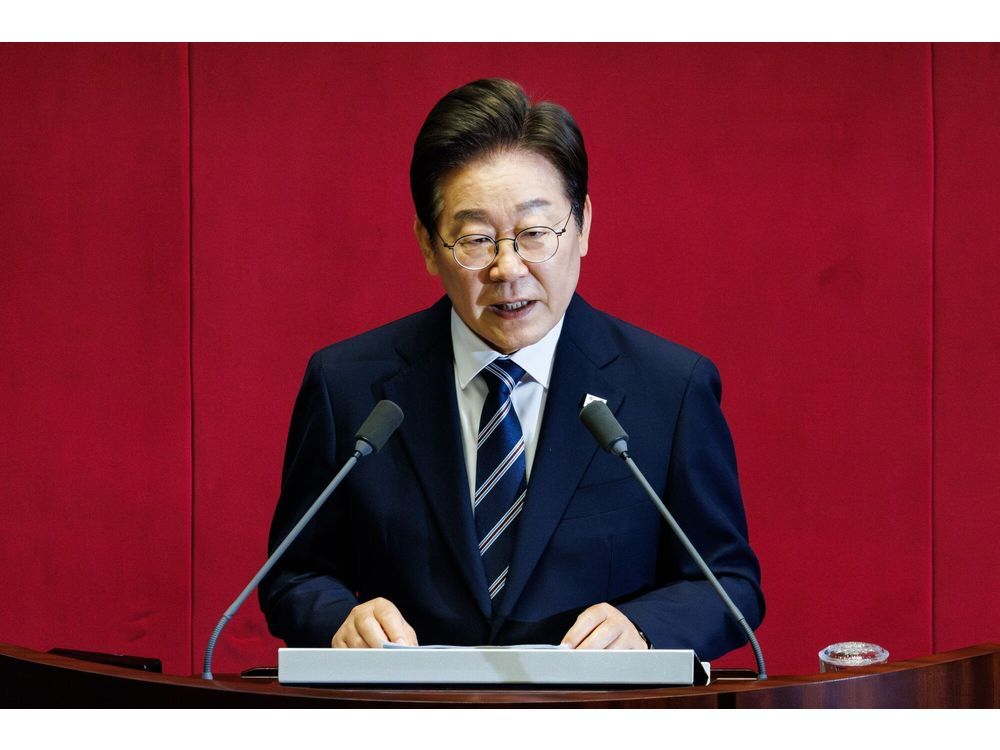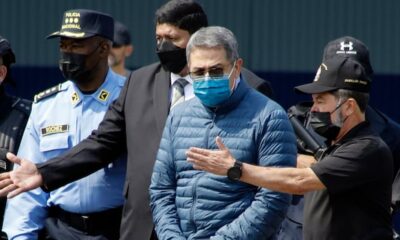Politics
South Korea’s Lee Meets Trump: Key Issues on the Table

South Korean President Lee Jae Myung is set to meet with former President Donald Trump at the White House on March 15, 2024. This marks Lee’s first official engagement with Trump since taking office less than three months ago. The discussions come on the heels of a recent trade deal, which has seen the Trump administration impose a 15% tariff on imports from South Korea, a key supplier of vehicles, smartphones, and machinery.
The bilateral talks will likely address several contentious issues, including the newly established trade deal and ongoing security concerns in Asia. Speaking to reporters en route to Washington, Lee emphasized his commitment to safeguard the interests of South Korean citizens, stating, “Even now, there is a clear perspective from the US side that the negotiations are looking favorable for South Korea. But we don’t think it’s desirable to so easily overturn or alter an agreement that has been reached.”
Investment and Economic Relations
One major point of focus will be the $350 billion investment fund South Korea has earmarked for projects in the United States. Announced alongside the trade agreement on July 31, 2023, Trump indicated that he would oversee the fund’s investments, with 90% of the profits expected to return to the U.S.
South Korean officials have provided limited details about the fund’s structure, but they have indicated it will largely consist of loan guarantees, with equity commitments likely remaining below 5%. A significant portion of this capital, $150 billion, is intended for U.S. shipyards, aimed at rejuvenating the struggling American shipbuilding industry. Lee plans to visit a shipyard in Philadelphia during his trip, underscoring the importance of this initiative and its potential impact on U.S.-South Korea relations.
Corporate Participation and Trade Tensions
Joining Lee at the meeting will be leaders from major South Korean corporations, including Samsung Electronics Co., SK Hynix Inc., LG Energy Solution Ltd., and Hyundai Motor Co.. Reports suggest that these firms may unveil up to $150 billion in new U.S. investment plans during the summit, which could help defuse potential tensions.
Several companies already have existing investments in the U.S., notably Samsung’s multibillion-dollar semiconductor facility in Texas and Hyundai’s $21 billion commitment to vehicle and steel production in the U.S. Nonetheless, experts warn that any perceived shortcomings in these commitments could provoke friction between the two nations. According to Bloomberg Economics’ Adam Farrar, failure to meet expectations could jeopardize the broader trade framework.
Agricultural Markets and Tariffs
Another critical issue is agriculture, specifically the potential for greater access for American agricultural products, such as beef and rice, to South Korea’s markets. Any concessions in this area could trigger backlash domestically, as South Korea has previously excluded these sensitive products from trade negotiations, citing their political importance.
Trump has urged South Korea to open its agricultural markets fully, creating the possibility of differing interpretations of the trade agreement, reminiscent of past U.S. dealings with China and the UK. The agricultural sector, accounting for approximately 1.5% of South Korea’s GDP, faces challenges, particularly as tariffs imposed by the U.S. impact broader economic sectors. Meanwhile, the automobile and semiconductor industries, which constitute over 40% of South Korean exports, are pressing for reduced tariffs on key products.
Security Concerns and Defense Spending
Security spending represents another pivotal topic in the upcoming discussions. Trump has consistently pressured U.S. allies to increase their defense budgets and rely less on American military support. South Korea hosts 28,500 U.S. troops, a strategic presence aimed at deterring North Korean threats.
Discussions about cost-sharing for defense have not been formally addressed in the context of tariff negotiations, yet a senior South Korean official has confirmed ongoing talks regarding an increase in Seoul’s defense spending, which is projected to reach 2.32% of GDP this year.
North Korea and Diplomatic Strategies
The summit is also expected to touch on the complex dynamics surrounding North Korea. Both Lee and Trump appear keen to shift away from the strategies employed by their predecessors. Trump previously engaged in three face-to-face meetings with North Korean leader Kim Jong Un, which failed to yield significant progress in denuclearization efforts.
Currently, North Korea has rejected overtures for dialogue and has aligned itself more closely with Russia. Recently, Kim called for the “rapid expansion” of his nuclear capabilities, heightening tensions just as the United States and South Korea began joint military drills, which North Korea perceives as a precursor to conflict.
As the summit approaches, experts suggest that North Korea will likely be a key agenda item, although significant breakthroughs may not occur unless both leaders agree to suspend military exercises and reassess denuclearization efforts. According to Rachel Minyoung Lee, a senior fellow at the Stimson Center, the summit may not create an opening for renewed engagement unless substantial shifts in policy are considered.
As the world watches, the outcomes of this meeting could significantly impact U.S.-South Korea relations, with potential consequences for trade, investment, and regional security dynamics.
-

 Politics4 weeks ago
Politics4 weeks agoSecwepemc First Nation Seeks Aboriginal Title Over Kamloops Area
-

 World5 months ago
World5 months agoScientists Unearth Ancient Antarctic Ice to Unlock Climate Secrets
-

 Entertainment5 months ago
Entertainment5 months agoTrump and McCormick to Announce $70 Billion Energy Investments
-

 Science5 months ago
Science5 months agoFour Astronauts Return to Earth After International Space Station Mission
-

 Lifestyle5 months ago
Lifestyle5 months agoTransLink Launches Food Truck Program to Boost Revenue in Vancouver
-

 Technology3 months ago
Technology3 months agoApple Notes Enhances Functionality with Markdown Support in macOS 26
-

 Lifestyle3 months ago
Lifestyle3 months agoManitoba’s Burger Champion Shines Again Amid Dining Innovations
-

 Top Stories2 months ago
Top Stories2 months agoUrgent Update: Fatal Crash on Highway 99 Claims Life of Pitt Meadows Man
-

 Politics4 months ago
Politics4 months agoUkrainian Tennis Star Elina Svitolina Faces Death Threats Online
-

 Sports5 months ago
Sports5 months agoSearch Underway for Missing Hunter Amid Hokkaido Bear Emergency
-

 Politics5 months ago
Politics5 months agoCarney Engages First Nations Leaders at Development Law Summit
-

 Technology5 months ago
Technology5 months agoFrosthaven Launches Early Access on July 31, 2025





















